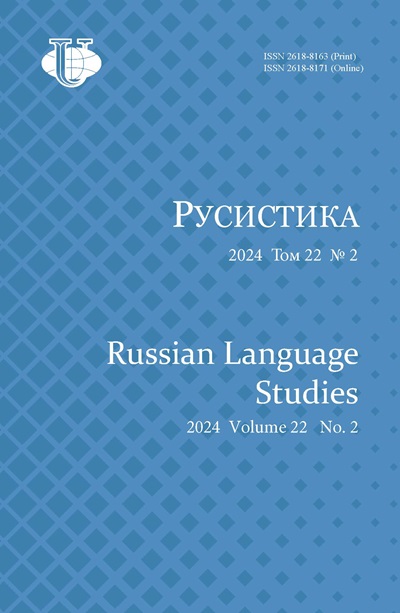Issue
Title
Authors
|
Cherkashina T.T., Novikova N.S., Sayenko T.I. |
|
Vodopianova K.M. |
|
Baryshnikova E.N., Shtyrina E.V. |
|
Ma Qing -. |
|
Shaklein V.M. |
|
Konstantinova L.A., Pronina E.V. |
|
Zahraee H.S. |
|
Ivanova M.V., Klushina N.I. |
|
Erofeeva I.N., Popova T.I. |
|
Slozhenikina Y.V., Rastyagaev A.V. |
|
Qiu X. |
|
Okoedion E.G., Okolie U.C. |
|
Heiser F. |
|
Ivanov E.E. |
|
Valipur A. |
|
Mamontov A.S., Moroslin P.V. |
|
Baranova I.I. |
|
Naumenko Y.M. |
|
Vasilyuk I.P. |
|
Baryshnikova E.N. |
|
Brygina A.V., Zorina G.S. |
|
Velichko A.V. |
|
Shaklein V.M. |
|
Shumilina S.A., Levina V.N. |
|
Abrosimova O.L., Voronova L.V. |
|
Markova E.M., Kvapil R. |
|
Soltys V.K. |
|
Senatorova O.A. |
|
Nikitina T.G. |
|
Tarasova N.I. |
|
Mamontov A.S. |
|
Shutova M.N., Orekhova I.A. |
|
Faje F.D. |
|
Tall Useinu -. |
|
Klimenko E.N. |
|
Shtirina E.V. |
|
Orlova E.V. |
|
Shmelkova V.V. |
|
Bereznjatskaja M.A., Serova L.K. |
|
Klimkievitch A. |
|
Ratsiburskaya L.V., Zhdanova E.A. |
|
Laposhina A.N., Lebedeva M.Y. |
|
Zavarzina G.A. |
|
Balakina K.D. |
|
Moskovkin L.V. |
|
Vyazovskaya V.V., Danilevskaya T.A., Trubchaninova M.E. |
|
Bozhenkova N.A., Bozhenkova R.K., Shulgina N.P. |
|
Rozboudova L., Konecny J., Markova E.M. |
|
Gasparian N.K. |
|
Nikolaenko S.V. |
|
Semenistaja M.N. |
|
Ramazanova S.I. |
|
Chesnokova O.S. |
|
Makarov V.I. |
|
Krasnova L.S. |
|
Nedosugova A.B. |
|
Muzychuk T.L. |
|
Moiseenko L.V., Gervilla E.Q. |
|
Deryabina S.A., Liubimova N.A. |
|
Maslova V.A., Danich O.V. |
|
Semaan N.V., Demesheva E.N., Baher T.V. |
|
Azimov E.G. |
|
Pivovar Y.S. |
|
Kozhevnikova E.V., Vyazovskaya V.V., Trubchaninova M.E. |
|
Petrova S.M. |
|
Koltsova L.M., Kudryavtseva T.Y., Churikov S.A. |
|
Ozyumenko V.I. |
|
Zavarzina G.A. |
|
Shustikova T.V., Žurkina N.V. |
|
Krotova T.A. |
|
Loginova I.M. |
|
Kurguzenkova Z.V. |
|
Martiryan N.I. |
|
Selezneva L.V., Severskaya O.I., Sahakyan L.N. |
|
Strelchuk E.N. |
|
Zhang W., Vesnina L.E. |
|
Ndyay M., Nguyen W.T., Grunina E.O. |
|
Bartosh J.V. |
|
Zolotykh L.G., Tsiu S. |
|
Nikitin O.V. |
|
Zhao Z. |
|
Gynin V.I. |
|
Timoshenko T.E., Ushakova O.A., Shuvalov V.L. |
|
Baryshnikova E.N. |
|
Tsareva N.Y., Budiltseva M.B. |
|
Granatova Y., Baryshnikova E.N. |
|
Khromov S.S. |











